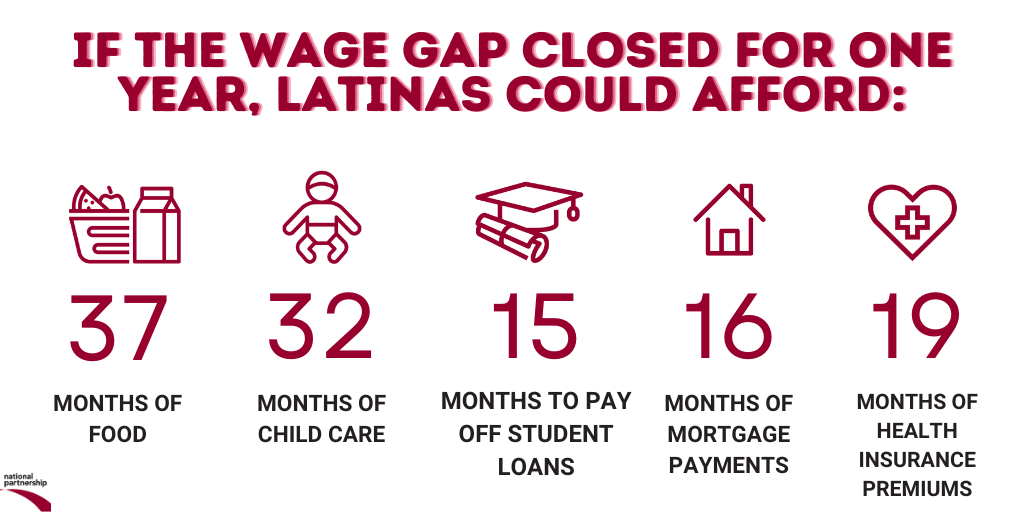The gender wage gap unfortunately exists and persists across every occupation, industry, state and demographic group. This year, the gender wage gap grew for almost every group, including Latinas. In 2023, Latinas were paid just 51 cents for every dollar paid to white, non-Hispanic men; that means that the typical Latina lost out on $30,800 in wages. On October 3, we commemorate Latina Equal Pay Day and recommit ourselves to the fight for fair pay.
Latinas are an important and growing part of our workforce, but too often they are not sharing in the prosperity their vital contributions help create. Latinas face a number of obstacles in the labor force that both contribute to and exacerbate the detrimental effects of a gender wage gap, such as: overrepresentation in low-wage service occupations, limited access to benefits and discrimination. These obstacles and associated wage disparities limit Latinas’ ability to build wealth, buy homes or save for the future, hindering their ability to thrive in our economy that depends on the labor of Latinas.

The annual value of unpaid care provided by Latinas is $133 billion; without this care, provided through love, many of our lives would be worse. A lack of comprehensive care policies keep many Latinas from entering or succeeding in higher-paying careers because of the need to continue providing unpaid care. Additionally, this country’s economic policies and legacies of racism have systematically devalued work in jobs where Latinas are overrepresented, including agricultural, housekeeping, and medical assistant jobs. Across the 10 occupations in which Latinas are most overrepresented, the average wage for full-time, year round workers is $55,200 – compared to $80,500 for white, non-Hispanic men in the occupations in which they are most overrepresented, or a gap of $25,300. Discrimination in hiring and advancement compound these issues and keep Latinas in jobs where they are paid poorly.
But Latinas are fighting for the higher wages they deserve, particularly through impressive union organizing. In 2023, also known as the year of the union, the share of Latina workers who were union members increased from 8.5 percent to 8.8 percent, the largest increase for any group of women. Latinas also see the largest “union bump,” or a wage increase of 34 percent – that’s the equivalent of almost $14,000 a year.
Additionally, there have been some policy wins in states with large Latina populations. In 2024:
- New York passed the first-of-its-kind paid prenatal leave. Latinos are the second-largest racial and ethnic group in New York at nearly 20% of the population.
- The California legislature passed multiple bills to strengthen and expand access to leave in the state, including bills that give working families more timely access to paid family leave and state disability insurance, provide health and safety protections to more than 175,000 domestic workers statewide, strengthen safe leave and remove barriers to paid family leave benefits. About 1 in 4 Latinos in the United States live in California.
While states continue to make progress toward closing the wage gap, Congress continues to lag behind. We call on Congress to pass critical and long overdue legislation to help close the wage gap:
- The Paycheck Fairness Act would encourage salary transparency in workplaces, protecting workers against retaliation for discussing salary, and prohibiting employers from paying new hires based on salary history.
- The Be HEARD Act would make workplaces safer, protecting workers from discrimination and harassment in the workplace.
- The Raise the Wage Act would raise the national minimum wage from $7.25 to $17 an hour by 2030.
- The FAMILY Act would provide up to 12 weeks of paid family and medical leave for workers.
- The Healthy Families Act is legislation that would provide workers with job-protected, paid sick days.
- The Protecting the Right to Organize (PRO) Act would strengthen workers’ rights to form a union and bargain for changes in the workplace.
Latina women must be paid equally so they can thrive in their careers, build wealth and support their families. Equal pay for Latinas will strengthen our economy and our country, but it’s also the right thing to do.
Credits: Authors would like to thank Gail Zuagar, Sharita Gruberg, Tehya Thompson, Jessica Mason, and Mettabel Law for their contributions.


